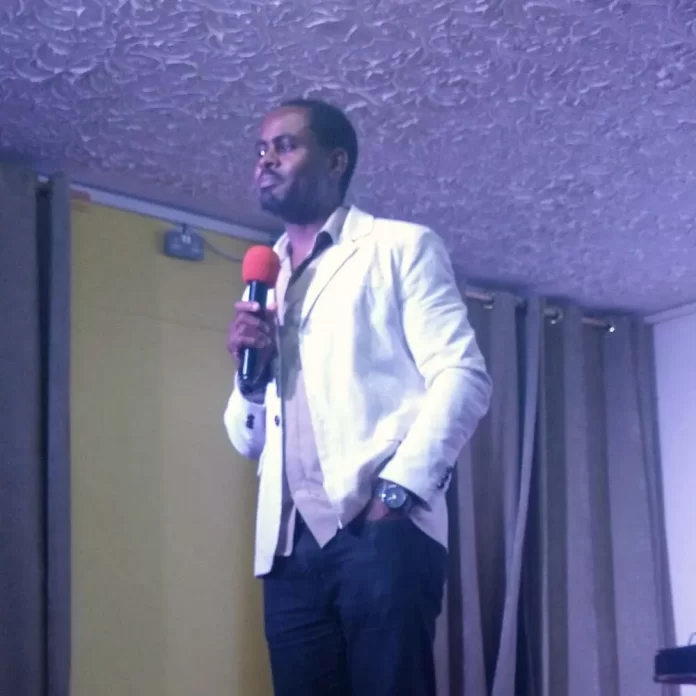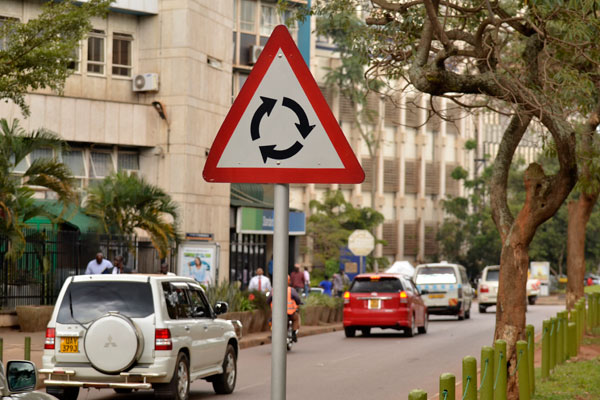Joshua Mmali is a 39 year old Ugandan/Kenyan man who prefers to identify himself as a global citizen of East African descent. He went to little-known schools in Kenya (Luuya Primary; Kivaywa Boys High School) and Uganda (Busia Forward Academy). You won’t find Busia Forward Academy on his academic papers though, because it didn’t have an examination centre, and he had to sit his A-Levels at Bukooli College, Bugiri. He studied English Language and Literature at Makerere University at the undergraduate degree level and went on to study Literature at Master’s level at the same university. Many years later, he obtained a Master’s in Communications, Media and Public Relations from the University of Leicester in the UK.
His first job was a teaching job at Kampala Students’ Centre, where he had been working part-time as he studied for his BA ED, and earned $20 a month! Two months after finishing his BA ED degree, and before graduating, the Department of Language Education at Makerere University hired him as Research Assistant, and a month later, he was hired to teach Communication Skills in The Institute of Languages at the same university.
More than a year later, in 2003, he started teaching Language and Literature at Aga Khan High School, Kampala, where he wrote and directed short plays for the annual School Play production. In 2006, he made a career jump; straight from the classroom into the studio, when he got hired by the BBC East Africa Bureau in Nairobi. In 2007, he returned to Kampala to report on the preps for CHOGM and to cover the actual event. He never went back to Nairobi! He would later, in 2008, be confirmed as the BBC Kampala Correspondent, and subsequently,go on to become – in 2010 – the BBC Uganda Bureau Chief. In 2012, he joined the UN’s Department of Public Information at the HQ in New York, where he currently works. This is Uganda had a chat with Joshua.
Tell us about your writing
I have written short drama skits and many poems (and lost many in the age of the diskette!). I am currently working on a collection of poems, which should come to maturity as an anthology in 2016. Oh, I tend to forget this: I have published a children’s book, The Bad Friends (Fountain Publishers, 2003). I have recently finished a short story (which is an excerpt from a novel I have been working on for a while). I hope I can get it published so that it inspires me to complete the novel. I have also written a play, The Betrothal, which had its first staged reading during the Kampala International Theatre Festival in November 2015. This is my first major work of drama. I have a plot for another play, but first, I want to see where The Betrothal will go.
What inspires you to write?
I tend to see myself as a romantic, so nature inspires me to write. Poetic lines tend to spring up in my head when I see the sea, sunrises and sunsets, the vegetation, and the clouds when I am up in the sky, flying. Beyond these, people inspire me to write; especially people who show interest in my writing. Nothing can be as inspiring as knowing there’s always that one person who will read anything you write, however crude it may still be. However, some people I have encountered in life have inspired me to write their stories too. For example, my short story, A Fixed Portrait Smile, is partly based on the story of a guy I lived with while I was doing my BA ED at Makerere.
What was the production you held at the National theatre about?
This was a performance/reading of my play, The Betrothal, which is the story of a mother and her two daughters, but it is also the story of many mothers in Uganda and other developing countries, who lose their children due to preventable causes of death. Often, it is because public officials steal funds meant for their treatment or vaccination, or fail to equip hospitals with the necessary facilities that could be used to prevent such deaths. This play is drawn from the Global Fund graft scandal in Uganda, where big names were implicated in the scandal but, as one judge put it, ‘only small fish were being fried’. My writing of this play was inspired, like the aforementioned judge, by my frustration with the justice system that only put smaller people behind bars while the big shots implicated in the scandal continued to roam free. In the play, I dramatize one such case, using a woman in a Ugandan village and her baby who missed an important vaccine because the health center did not have enough vials. I juxtapose that story with the story of a young gentleman who works in the Ministry of Health. After stealing a lot of money with his bosses, this public official is intent on marrying his beautiful girlfriend, who, coincidentally, is a daughter to the village woman mentioned earlier. The rest of the story is what everyone should look forward to in the full production of the play in 2016.
What challenges do you face as a writer?
Whereas I enjoy being immersed in creative writing, I don’t always write. First, I am not a full-time writer. There are people who have pursued that as a career; bless them! I have a full-time job, and that means I only write in the evenings after work, on holidays, or on the weekends. That’s a big challenge, especially if you want to be a prolific writer.
Secondly, there are all these social engagements that get in the way: family, friends, relationships, etc. You can’t always say no to friends inviting you to go out, just because you need to finish a story or a poem, can you? If you keep on doing that, they give up, and you end up alone and lonely.
Thirdly, there are times when you’re just not inspired to write. It could be a phase you’re going through in life- a break-up, financial difficulties or the loss of someone close. During such times, you end up having a freeze on your creativity, because your muse is just not there at all. I remember how difficult it was for me to write when I struggled financially – you expend a lot of thought on how to get yourself out of your dire financial straits rather than on being creative.
We would like to know your thoughts on the portrayal of Africa by the western media?
Africa has always been portrayed negatively in the Western media. Whereas there’s a lot of truth in what they portray, their representation of Africa is always lopsided, as though only disease, hunger, and conflict exist in Africa. The blanket categorization of Africa as teeming with dictators is certainly not fair. There are success stories of democracy in countries like Botswana, Ghana, Tanzania, now Nigeria, to name but a few. Without romanticizing the situation in Africa, these stories have to be told too, when stories of dictatorship and stolen elections are being told. However, there’s a deliberate shift in the narrative now, with more and more Africans telling their own story. Even the mainstream Western media have now turned to Africans to tell the story of Africa – the BBC has been increasingly relying on Africans to report about Africa since my days, and we can see the same happening with CCTV and other broadcasters.
Having lived out of Uganda. What in your view is the African story?
I see Africa rising, I see hope. African economies are growing faster than in other parts of the world; Africa still has a rich endowment of natural resources. But the quality of life is still very low in many countries. Governments have to value human life more than they do. There is no reason why 16 women should die while trying to give birth in Uganda daily. Investing in infrastructure is crucial. Investing in people is all that matters. The youth in Africa are hungry for success and hungry for change. They want to see their lives changing now, and they want leadership that can inspire them to achieve that change, to innovate and to create things. Leaders have to make the surplus human resource that the youth represent count. But successful African professionals and entrepreneurs have a role to play too: inspire the youth, invest in them. There is no point in accumulating a lot of wealth alone yet you’re surrounded by youth who are desperate for just a little to change their lives. If they don’t find what to eat, they will eat you up with all the wealth you’ve amassed, and that is dangerous. African universities have also improved rankings, which is good for Africa’s youth and scholars. Innovations in technology are springing up from every corner. The entertainment industry is growing, and African dance moves continue to influence Western dance- Beyoncé had to fly a Mozambican dance group to the US to help with the choreography in ‘Run the world (Girls)’
What advise would you like to give to Ugandan writers?
Advice to writers? I am no big name in the writing business, but I have a few words for those who want to start writing and for the part-time writers like me: create that time and write. When you do a day job like mine, you create for the organization or your employer. When you write, you create something for yourself. Be patient. Your work will not be published immediately. But it shouldn’t stop you from writing. Also, start thinking about self-publishing. I’ve been reading about its benefits, and I’ll be self-publishing a book next year. You need to invest money in this, but I think it works better in the long run.
Any last words for our readers?
We have a bad reputation for not reading. Ugandans have a more prominent talking culture than a reading a culture. I would love to see the two cultures swapping places. Your brain is only as good as what you nourish it with. Most of its nourishment comes from reading.




















